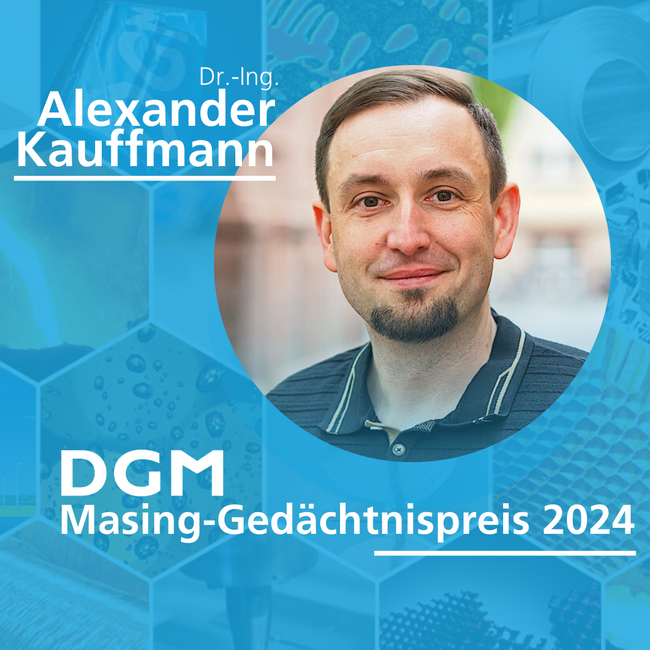The Masing Memorial Prize honors scientific work published within the last two years before the award is given. The dissertations of the nominees must have been completed no more than 10 years ago. The Masing Memorial Prize 2024 has been awarded to Dr.-Ing. Alexander Kauffmann from the Karlsruhe Institute of Technology (KIT).
1) Dr. Kauffmann, what does receiving the Masing Memorial Prize mean to you and what role has the German Society for Materials Science (DGM) played in your professional development, especially during your 15 years of membership?
The recognition of the work that my team and I have done over the past years is truly remarkable and I am very happy about it. Looking at the list of previous winners, I personally consider the Masing Memorial Award a great honor. Materials science is characterized by a wide range of interconnected fields, and for me the DGM as my professional association is the central organization through which I have been able to engage with this diversity in Germany and meet the relevant scientists. I don't think this would have been possible without the DGM.
2) As head of the Physical Metallurgy Department at IAM-WK, you have successfully built up a thriving research group. What approaches and strategies have you used to establish and maintain this group?
Since the majority of Physical Metallurgy at KIT is in the university domain, our work is strongly focused on the Ph.D. projects of our researchers. During this intense period for our staff, I (and not only I) strive to provide the same level of dedicated professional and organizational support that I received during my own Ph.D. studies. In addition to the successful training of our Ph.D. students, this approach continuously enhances our scientific capabilities. In addition, the group has evolved consistently from the beginning, and we adapt flexibly to new challenges and needs to maintain our development.
3) Your work on RM-based Cr-Si-Mo alloys and high-entropy alloys has significant potential for high-temperature applications. What are your long-term goals in this area of research and what impact do you expect your findings to have?
Our long-term goal is to push the limits of metallic materials at high temperatures in order to achieve more efficient energy conversion in high-temperature processes, which will be necessary for decades to come. Reaching the highest possible temperatures will only be possible with new materials. This is a very ambitious goal, given the technical and economic sophistication of existing materials concepts. We are focusing primarily on properties that have been critical and limiting to potential applications, such as oxidation resistance and ductility, for which there are not yet sufficient materials science design concepts or predictive techniques.
4) You are known for your openness and commitment to knowledge transfer. What motivates you to share your passion for science and your insights with others?
Materials are ubiquitous, although awareness of this fact is often lacking. Therefore, any form of attention given to our field is beneficial. In my case, my specialization allows me to combine technical skills, particularly in metallography and materials characterization, with theoretical aspects of great depth. I hope that students, for example, will see this and appreciate the attractiveness of the field. In addition, society, through our scientific system, provides us with the opportunities and freedoms we enjoy. It is therefore our responsibility to document, share and promote the knowledge we generate.
![[Translate to English:]](/fileadmin/_processed_/f/0/csm_logodgm-4_b2722eeace.png)
![[Translate to English:]](/fileadmin/user_upload/logodgm-4.png)
